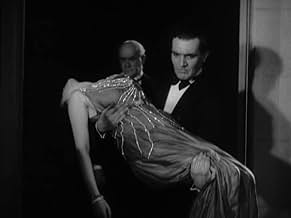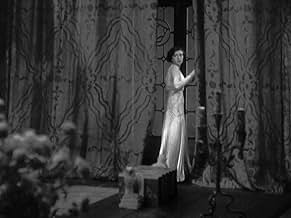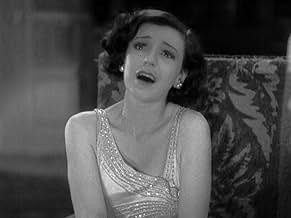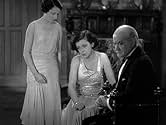AVALIAÇÃO DA IMDb
5,7/10
3,8 mil
SUA AVALIAÇÃO
Uma antiga família tradicional e uma família moderna lutam por terras em uma pequena vila inglesa e acabam quase se destruindo uns aos outros.Uma antiga família tradicional e uma família moderna lutam por terras em uma pequena vila inglesa e acabam quase se destruindo uns aos outros.Uma antiga família tradicional e uma família moderna lutam por terras em uma pequena vila inglesa e acabam quase se destruindo uns aos outros.
- Direção
- Roteiristas
- Artistas
Rodney Ackland
- Man at Auction
- (não creditado)
Ivor Barnard
- Man at Auction
- (não creditado)
Wally Patch
- Van Driver
- (não creditado)
- Direção
- Roteiristas
- Elenco e equipe completos
- Produção, bilheteria e muito mais no IMDbPro
Avaliações em destaque
I recently saw Hitchcock's "Rich and Strange" and really enjoyed it, so I was game for another go at this early 1930's British cinema, in my attempt to become a "Hitchcock completist." Please keep in mind that I'm an American with a pretty-good ear for British dialog, but there are some speeches contained here that I couldn't understand in the least. But only a fairly small portion that is. The early sound equipment doesn't help either.
The title "The Skin Game" refers to a heated altercation that leaves no holds barred, and no prisoners taken. The plot line is essentially a "Hatfields and McCoys" family feud over land rights, with a lot of dirt being dug up on both families involved. Like pretty much all early sound films, there is a heavy reliance on dialog and the spoken phrase, which makes "The Skin Game" obviously derived from the stage.
At the beginning there's a long take with probably ten pages of dialog in it, using a medium shot of three characters, with the camera panning between them. At least once, someone was speaking dialog while not on camera, which I always find distracting -- a minor flaw I admit, but noticeable. Hitchcock's pacing feels relatively quick considering, and he keeps interest in these scenes with dramatic exits and entrances of characters, and revelations of plot details.
Really some of these takes were so long that actors coughed, dropped things and retrieved them, and other apparent flubs that were never re-shot. Seems like once the director was five minutes into a scene he couldn't afford the film stock to begin again, so there are a lot of miscues and such, which kind of adds to the immediacy. Especially considering that I'm certain that even the young Hitchcock was keenly aware of every missed cue and dropped line, and it had to drive him to distraction! I was certainly impressed by this early Hitchcock effort and I'm sure that audiences back then went away from this one with the feeling that they got their money's worth. It was apparent that an extremely talented film maker was at work here, trying to keep the audience involved every step of the way. And he did succeed actually.
For instance, there is a scene at an auction house that lasts for about ten minutes, and Hitchcock sets it up in such a way to keep the audience anxiously awaiting the outcome. He has the camera making very fast pans from one bidder to the next, slowing down only when the bidding does. The audience has some background information about the proceedings, but not enough to spoil the surprise at the end.
It's early sound cinema -- so most viewers today can't bear this kind of thing, but if you're familiar with and enjoy films of the early 20Th Century, it's extremely enjoyable and does have a payoff at the end! *** out of *****
The title "The Skin Game" refers to a heated altercation that leaves no holds barred, and no prisoners taken. The plot line is essentially a "Hatfields and McCoys" family feud over land rights, with a lot of dirt being dug up on both families involved. Like pretty much all early sound films, there is a heavy reliance on dialog and the spoken phrase, which makes "The Skin Game" obviously derived from the stage.
At the beginning there's a long take with probably ten pages of dialog in it, using a medium shot of three characters, with the camera panning between them. At least once, someone was speaking dialog while not on camera, which I always find distracting -- a minor flaw I admit, but noticeable. Hitchcock's pacing feels relatively quick considering, and he keeps interest in these scenes with dramatic exits and entrances of characters, and revelations of plot details.
Really some of these takes were so long that actors coughed, dropped things and retrieved them, and other apparent flubs that were never re-shot. Seems like once the director was five minutes into a scene he couldn't afford the film stock to begin again, so there are a lot of miscues and such, which kind of adds to the immediacy. Especially considering that I'm certain that even the young Hitchcock was keenly aware of every missed cue and dropped line, and it had to drive him to distraction! I was certainly impressed by this early Hitchcock effort and I'm sure that audiences back then went away from this one with the feeling that they got their money's worth. It was apparent that an extremely talented film maker was at work here, trying to keep the audience involved every step of the way. And he did succeed actually.
For instance, there is a scene at an auction house that lasts for about ten minutes, and Hitchcock sets it up in such a way to keep the audience anxiously awaiting the outcome. He has the camera making very fast pans from one bidder to the next, slowing down only when the bidding does. The audience has some background information about the proceedings, but not enough to spoil the surprise at the end.
It's early sound cinema -- so most viewers today can't bear this kind of thing, but if you're familiar with and enjoy films of the early 20Th Century, it's extremely enjoyable and does have a payoff at the end! *** out of *****
"The Skin Game" is one of Alfred Hitchcock's earlier sound pictures, and although the story held potential, it is a rather bland film despite a couple of good Hitchcock touches.
The story centers on a rivalry between two neighboring families who have very different views on the future of their community. Mr. Hornblower (Edmund Gwenn) wants to see the land developed and used for factories and businesses, while the Hillcrest family wants to see the traditional homes and countryside preserved. The resulting conflicts hold some real potential, and lead to some good moments as the families try to outwit each other in a "skin game", but the movie as a whole is never really very compelling.
It's hard to pinpoint exactly why this is not a better film. There are no big names in the cast, but Hitchcock made several fine movies with just this sort of cast. Gwenn is good in his role, and Phyllis Konstam is believable and sympathetic as his daughter-in-law whose troubled past eventually provokes a crisis between the two families.
Perhaps Hitchcock stayed too close to the play on which the film is based (it does have a bit of a stage-bound feel), or perhaps for once he did not have a strong sense of the material's potential.
Hitchcock saved his best for the movie's most important scene, when a crucial parcel of land is auctioned off. The auction scene, and a confrontation afterwards between the main characters, is well-done with some good twists.
There are also some nice ironic touches at the end.
Hitchcock fans should still watch "The Skin Game" at least once, to notice the ways that the director's usual touch can be seen, but this movie may not be of much interest to others.
The story centers on a rivalry between two neighboring families who have very different views on the future of their community. Mr. Hornblower (Edmund Gwenn) wants to see the land developed and used for factories and businesses, while the Hillcrest family wants to see the traditional homes and countryside preserved. The resulting conflicts hold some real potential, and lead to some good moments as the families try to outwit each other in a "skin game", but the movie as a whole is never really very compelling.
It's hard to pinpoint exactly why this is not a better film. There are no big names in the cast, but Hitchcock made several fine movies with just this sort of cast. Gwenn is good in his role, and Phyllis Konstam is believable and sympathetic as his daughter-in-law whose troubled past eventually provokes a crisis between the two families.
Perhaps Hitchcock stayed too close to the play on which the film is based (it does have a bit of a stage-bound feel), or perhaps for once he did not have a strong sense of the material's potential.
Hitchcock saved his best for the movie's most important scene, when a crucial parcel of land is auctioned off. The auction scene, and a confrontation afterwards between the main characters, is well-done with some good twists.
There are also some nice ironic touches at the end.
Hitchcock fans should still watch "The Skin Game" at least once, to notice the ways that the director's usual touch can be seen, but this movie may not be of much interest to others.
....this is good early Hitch! good screenplay,good directing and good acting!Phyllis Konstam is the stand-out .Her portrayal of Chloé can still grab today's audience .
Good scenes:
-the auction sale,twenty-eight years before "North by Norwest" ,is one of the most suspenseful moments of the Master's English era.And there's a brilliant unexpected twist when we think it's over!
-when Chloe takes refuge in her father-in-law's enemy's house,the things seem to have a life of their own:the door,the window,the curtains..
And in 1931,Hitchcock avoids over-simplification:who is good,in the end?who is evil?The local squire and his lady or the arrogant nouveau riche?Who did you have to save?the old couple or the ill-fated Chloé?
In the Truffaut/Hitchcock book,the master says "I did not choose that subject and there is nothing to say about it."
Good scenes:
-the auction sale,twenty-eight years before "North by Norwest" ,is one of the most suspenseful moments of the Master's English era.And there's a brilliant unexpected twist when we think it's over!
-when Chloe takes refuge in her father-in-law's enemy's house,the things seem to have a life of their own:the door,the window,the curtains..
And in 1931,Hitchcock avoids over-simplification:who is good,in the end?who is evil?The local squire and his lady or the arrogant nouveau riche?Who did you have to save?the old couple or the ill-fated Chloé?
In the Truffaut/Hitchcock book,the master says "I did not choose that subject and there is nothing to say about it."
"The Skin Game" is not exactly classic Hitchcock-- no one could dispute that. But I still think it does not entirely deserve its bad ratings. There are a few--not too many, but a few-- interesting scenes and surprises. The characters are fairly sympathetic and well-drawn.
I think the fault of "The Skin Game" lies not in the fact that it is a stage-bound play-- Hitchcock worked wonders on screen with stage-bound plays, notably "Rope" and "Dial M for Murder". Perhaps it is that the emotions of the characters are not focused upon-- the camera keeps rather too distant. If the tone were more personal in this film, the performers might have a better chance to hold our interest.
If you are looking for entertainment and stimulation that one can normally find in a Hitchcock-- better to look somewhere else.
I think the fault of "The Skin Game" lies not in the fact that it is a stage-bound play-- Hitchcock worked wonders on screen with stage-bound plays, notably "Rope" and "Dial M for Murder". Perhaps it is that the emotions of the characters are not focused upon-- the camera keeps rather too distant. If the tone were more personal in this film, the performers might have a better chance to hold our interest.
If you are looking for entertainment and stimulation that one can normally find in a Hitchcock-- better to look somewhere else.
Fine and interesting story from the play of the same name adapted by Alfred Hitchcock himself and his wife and usual writer Alma Reville . Dealing with two British families : the aristocratic Hillcrist family, and Hornblower family headed by proud and ambitious Mr. Hornblower : Edmund Gwenn , both of them feud over land rights . As the latter , the mercilessly pushy Mister Hornblower sends away and evicts poor farmers to build factories on their lands . After that , Mr. Hornblower outwits Hillcrist in an auction for an additional piece of area property , the wealthy Hillcrists find their big estate completely surrounded by the upstart Hornblower . Things go wrong when Mrs. Hillcrest settles a terrible secret about a dark past of the Hornblower family .
It isn't thrilling , neither suspenseful , non characteristic of working with Hitchcock , but a tumultuous and strong drama . Way too much talking in excruciating , long and drawn-out scenes . This is a brooding drama whose premise turns out to be the hard confrontation between a rich family , the Hillcrests , fighting against the speculator who attempts to make a chimneyed factory complex , Hornblower , then emerges a dark secret resulting in tragic consequences , as it is used as a blackmail againts the speculator and force him to stop doing business . Performances are uniformly good , though in an excessive theatrical style . Based on a successfyl play and still stunningly hypnotic to see today . In fact , being , nowadays ,more stimulating for its innovations in that area , and by experimenting with a peculiar narrative structure . This fine early effort by Hitch has several novelties , as the movie transcends the limitation of its dramatic plot by dealing with thought-provoking issues and focusing on the theatrical meditations of reality . Here Alfred gives a few signs to be an expertise at tightening tension that was already building up . Main known actor results to be Edmund Gwen , giving a nice acting as the nouveau riche, social climber Mr. Hornblower who buys a lot of property abutting their state. Along with other notorious but unknown actors such as : Jill Esmond , Helen Haye , Phyllis Konstam, John Longden, Frank Lawton , C. V. France , Herbert Ross , among others .
This early talkie motion picture was well realized by the famous Alfred Hitchcock and made in his previous British period . His first sound film for Great Britain was ¨Blackmail¨, being made as a silent movie , this one was really an early talkie . This film ¨Skin Game¨1931 belongs to Hitch's first British epoch when he directed silent films, such as ¨The lodger¨ (1926) , ¨The ring¨(1927) , ¨Easy virtue¨ (1927) , ¨The Manxman¨(29) ; being ¨Blackmail¨(29) made as a silent , this was reworked to become a talkie . Following sound movies and early talkies as ¨Murder¨(1930 , ¨June and the Paycock¨(30) , ¨Rich and strange¨(32) , ¨Number 17¨(32) , ¨The man who knew too much¨(34) , ¨The 39 steps¨ (35) , ¨The secret agent¨(36) , ¨Sabotage¨(36) , ¨The lady vanishes¨(38) , ¨Jamaica Inn¨ (39) until he is hired by David O'Selznick to shoot¨Rebecca¨(40) in the US and continuing with other popular movies and masterpieces with world successes .
It isn't thrilling , neither suspenseful , non characteristic of working with Hitchcock , but a tumultuous and strong drama . Way too much talking in excruciating , long and drawn-out scenes . This is a brooding drama whose premise turns out to be the hard confrontation between a rich family , the Hillcrests , fighting against the speculator who attempts to make a chimneyed factory complex , Hornblower , then emerges a dark secret resulting in tragic consequences , as it is used as a blackmail againts the speculator and force him to stop doing business . Performances are uniformly good , though in an excessive theatrical style . Based on a successfyl play and still stunningly hypnotic to see today . In fact , being , nowadays ,more stimulating for its innovations in that area , and by experimenting with a peculiar narrative structure . This fine early effort by Hitch has several novelties , as the movie transcends the limitation of its dramatic plot by dealing with thought-provoking issues and focusing on the theatrical meditations of reality . Here Alfred gives a few signs to be an expertise at tightening tension that was already building up . Main known actor results to be Edmund Gwen , giving a nice acting as the nouveau riche, social climber Mr. Hornblower who buys a lot of property abutting their state. Along with other notorious but unknown actors such as : Jill Esmond , Helen Haye , Phyllis Konstam, John Longden, Frank Lawton , C. V. France , Herbert Ross , among others .
This early talkie motion picture was well realized by the famous Alfred Hitchcock and made in his previous British period . His first sound film for Great Britain was ¨Blackmail¨, being made as a silent movie , this one was really an early talkie . This film ¨Skin Game¨1931 belongs to Hitch's first British epoch when he directed silent films, such as ¨The lodger¨ (1926) , ¨The ring¨(1927) , ¨Easy virtue¨ (1927) , ¨The Manxman¨(29) ; being ¨Blackmail¨(29) made as a silent , this was reworked to become a talkie . Following sound movies and early talkies as ¨Murder¨(1930 , ¨June and the Paycock¨(30) , ¨Rich and strange¨(32) , ¨Number 17¨(32) , ¨The man who knew too much¨(34) , ¨The 39 steps¨ (35) , ¨The secret agent¨(36) , ¨Sabotage¨(36) , ¨The lady vanishes¨(38) , ¨Jamaica Inn¨ (39) until he is hired by David O'Selznick to shoot¨Rebecca¨(40) in the US and continuing with other popular movies and masterpieces with world successes .
Você sabia?
- CuriosidadesThe title comes from a slang phrase for "an unscrupulous business operation". Although this movie is British, the term is considered American and dates back to just after the American Civil War (1861-1865). It is not to be confused with the similar-sounding aphorism "to have skin in the game", which refers to someone who has a stake, financial or emotional, in a business deal, wager, or other situation.
- Citações
[last lines]
Mr. Hillcrist: What is it that gets loose when you start a fight, and makes you what you think you're not? Begin as you may, it ends in this skin game! Skin game! When we began this fight, we'd clean hands. Are they clean now? What's gentility worth if it can't stand fire?
- ConexõesFeatured in Paul Merton Looks at Alfred Hitchcock (2009)
- Trilhas sonorasHabanera
(1875) (uncredited)
from "Carmen"
Music by Georges Bizet
Libretto by Henri Meilhac and Ludovic Halévy
Excerpt whistled by Jill Esmond
Principais escolhas
Faça login para avaliar e ver a lista de recomendações personalizadas
Detalhes
- Data de lançamento
- País de origem
- Idioma
- Também conhecido como
- The Skin Game
- Locações de filme
- Elstree Studios, Borehamwood, Hertfordshire, Inglaterra, Reino Unido(Studio, destroyed during World War II and later rebuilt)
- Empresa de produção
- Consulte mais créditos da empresa na IMDbPro
- Tempo de duração
- 1 h 25 min(85 min)
- Cor
Contribua para esta página
Sugerir uma alteração ou adicionar conteúdo ausente
































